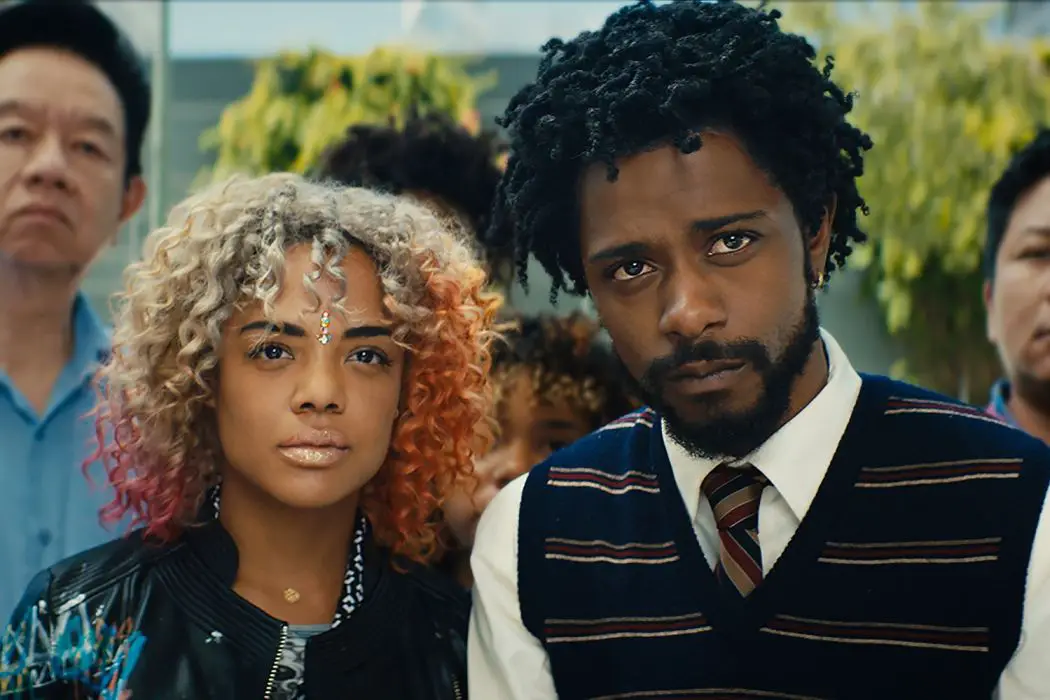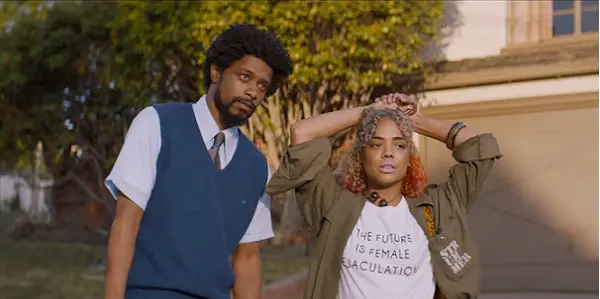SXSW Review: SORRY TO BOTHER YOU: Boots Riley’s Absurdist, Existential, Surreal, Anti-Capitalist Sci-Fi Masterpiece Of A Debut

Hazem Fahmy is a poet and critic from Cairo. He…
There can no longer be any doubt that American cinema is currently undergoing a renaissance of Black filmmaking. Though American film is by no means a stranger to Black excellence across the board, the 2010’s have ushered in a new wave of opportunity for radically diverse works by pioneering Black filmmakers across both film and television. From Barry Jenkins and Jordan Peele’s award-sweeping indies, to Ryan Coogler and Ava DuVernay’s landmark blockbusters, to Issa Rae and Donald Glover’s redefinition of comedy television – one could go on and on, and one would like to, but for the purpose of this piece, let me switch your attention to Boots Riley.
Most commonly known for his work as the lead vocalist of the rap-rock supergroup Street Sweeper Social Club, Riley’s foray into film is one of the boldest and wildest in recent memory. If Hemingway advised writing drunk and editing sober, this film feels like it was conceived in the most profound of acid trips, only to be polished into an experience that is as gorgeous as it is truly horrifying. I don’t throw around the phrase: “I’ve never seen anything like that before,” but I can confidently say that I have absolutely never seen anything like Sorry to Bother You before. It is a plethora of paradox; as puzzling as it is revealing. You get the picture. Except you don’t. You have to see this movie.
Where to Begin
This is usually the part where I give a brief plot synopsis, to get you more or less on the same page, but I am genuinely baffled, dear reader. I don’t know how to summarize this movie. Maybe that reflects badly on me as a critic, so be it. I don’t think this is a story that can preserve a sliver of its essence of the page, but let me try, even if it ends in futility: Sorry to Bother You follows the trials of a young Oakland man, Cassius Green, played pitch perfect by Lakeith Stanfield, as he begins a low-paying job at a telemarketing company. That’s it. That’s all I have to say without spoiling either the plot or the experience. Does this frustrate you? I am genuinely sorry if it does, but once again: you have to see this movie.

There are a thousand ways I could summarize Sorry to Bother You and each would be accurate, but none would be even close to complete. I could call it a workplace satire that comments on the absurdity and cruelty of economic exploitation. Or I could call it a sci-fi allegory for the existential, and even physical, toll that capitalist industry takes on society. Or I could call it a socialist rallying cry for an African-American-led revolution. Etc. This film is all the above, and essentially none of it. Such is the uncompromising uniqueness of Riley’s vision. It stays singular while oozing with pastiche. I won’t say it cause you already know how I feel about how you have to see this movie.
If my scattered thoughts have made the film’s plot or pace seem flaky, that’s on me. In fact, Riley does an astounding job of grounding us firmly in a familiar geographical, economic and psychic space before shit hits the fan. Like many youth across the country and world, whether of color or not, Cassius feels constrained by a meaningless, exploitative job. He lives with his uncle (one of Terry Crews’s best cameos) in a rapidly gentrifying Oakland. He feels that his loving relationship with his girlfriend Detroit (another seamless Tessa Thompson run) is under threat from his financial instability. He feels lost and purposeless. Getting work changes all that, but not in any way you might expect.
Radical Hodge Podge
From there on out, Riley gives himself the well-earned liberty to just go batshit. But his style never feels arbitrary nor forced. There’s an odd cohesiveness to his haphazard reimagination of our present day reality. In one scene, Cassius is having a drink at a bar with Langston, an elderly co-worker and brief mentor played, excellently, by Danny Glover. Langston orders whiskey and the bartender is about to hand him some generic, Jack Daniels-looking rye, when he interrupts her and asks for the “good stuff.” She hastily opens one of said Jack Daniels-lookalike bottles to reveal a smaller bottle hidden inside. Langston drinks the whiskey. We never see anything like that again. It’s an inexplicable moment, one that Riley lingers on, seemingly for no other purpose than to force you to look at his bizarre world building. But it works. Paired with a thousand strange moments like that, you eventually see the world through Riley’s distorted vision. It’s thrilling, and deeply uncomfortable.
In a different, visually captivating sequence, Riley portrays the material changes in Cassius’s life as he begins to accrue wealth from his job. Feeling more confident, he and Detroit begin making love in his dingy room in his uncle’s house, but quickly the room transforms before our eyes into his new apartment downtown. As the two are making out on the bed, everything around them, from the bed sheets and walls to the tabletops, radically change to reflect all the money Cassius is making. Though Stanfield and Thompson are captured regularly here, everything else is in stop motion. New lamps emerge from old ones, the bed sheets shuffle away. There’s a delightful playfulness to it, but it’s also a somber farewell to the life Cassius one had.

Again, there’s not a single hint of stop motion anywhere else, but it doesn’t matter. Sorry to Bother You thrives on these kinds of surprises. When Armie Hammer’s coked-up Steve Lift shows up, he feels completely out of left field, yet completely in tune with the absurdity of the film. Each radical change in the plot invites new possibilities. This is where Riley’s position as (previously) an outsider to the world of filmmaking has actually served him. I don’t think this film is as inventive as it is in spite of Riley’s cinematic inexperience, rather I think it is because of it. He clearly came to the table with a big box of ideas he wanted to unpack and play with, but he also came with the kind of raw hunger for visual storytelling only a newcomer could still have.
All in all, there’s no single theme Riley focuses on more than capitalism, as both temptation and corruption. His dystopian vision of Oakland is as character-driven as it is attuned to the systemic nature of racialized violence and exploitation. Cassius isn’t exactly sure what he’s pursuing: perhaps liberty, perhaps love, perhaps dignity. Work brings him none of it, only money. Strangely enough, Sorry to Bother You is riddled with moments and scenarios that seem prime for cliché didacticism, but it never feels like. Quite the contrary, Riley’s embrace, and in some cases subversion, of these clichés feeds into his grotesque and poignant accumulation of kitsch.
One of the most disturbing turns in the movie, and that’s saying a whole lot, comes after Cassius is assaulted by a soda can at a protest. The video of the white woman throwing the can at him goes viral and, in response, a costume that involves afros with soda cans attached to them floods the market. It doesn’t take long for Cassius to notice little white kids walking around with these, essentially blackface, costumes. The girl from the protest even gets a spotlight on TV. This is where Riley triumphs over the didactic. He doesn’t set out to explain to you how capitalism and its bastard cousin liberalism are bad – in fact, it would appear as though he trusts his viewer to a certain degree to already know that. Instead, he offers you an alienating look at what it does the human body at large, but especially to the Black body. Brecht would have been proud.
Capitalism’s effect on Cassius is most apparent in his seeming need to employ a so-called “white voice.” As Langston explains to him, no Black telemarketer at their office can hope to succeed without one, and oh, does Cassius succeed. In fact, he moves up the ladder specifically because he is the best of his cohort at his white voice, a perfectly casted David Cross. As he gets closer to the top, he begins to see more and more the futility of his code switching. This eventually culminates in a harrowing rap performance he is forced to give in which a white crowd literally yells the phrase “n–––a shit!” at him over and over and over again.

All that said, Detroit’s unfortunately short screen time, in relation to Cassius, is somewhat disappointing. Riley aptly develops her aesthetic, but otherwise leaves much wanting. We mostly see the relationship from Cassius’s side which causes the story to veer a little too close to Manic Pixie Dream Girl territory. The film saves itself from going in full steam by subverting that, constantly challenging Cassius’s expectations for their romance, but one wishes we could’ve spent more time with Detroit on her own. The character allowed for Thompson to flex her comic muscles like never before, as well as touch of her dramatic, and it would’ve been an absolute to joy to get more of that, especially since Detroit, too, goes through a fascinating arc with white institutions, in her case those of the art industry, leading to a traumatic and exploitative performance. She should definitely have her own spin-off.
Sorry to Bother You: Conclusion
Then again, do not take my word for it. This film is just so visually dense and dynamic that I’m honestly coming up short on an intelligible language to communicate its sheer excellence. If I am ever blessed with the opportunity to grow as a critic, I will perhaps return to Sorry to Bother You and take a better shot at demystifying it to the curious reader. Till then, please go watch this film.
Who’s your favorite outsider filmmaker?
Sorry to Bother You premiered at the 2018 Sundance Film Festival and played at the 2018 SXSW Film Festival. It will be released in the US on July 6.
Does content like this matter to you?
Become a Member and support film journalism. Unlock access to all of Film Inquiry`s great articles. Join a community of like-minded readers who are passionate about cinema - get access to our private members Network, give back to independent filmmakers, and more.
Hazem Fahmy is a poet and critic from Cairo. He is an Honors graduate of Wesleyan University’s College of Letters where he studied literature, philosophy, history and film. His work has appeared, or is forthcoming in Apogee, HEArt, Mizna, and The Offing. In his spare time, Hazem writes about the Middle East and tries to come up with creative ways to mock Classicism. He makes videos occasionally.












